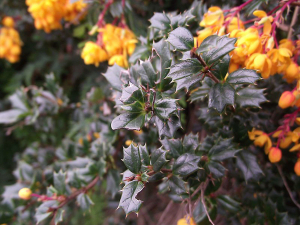EPA remains committed to deliver improved outcomes
OPINION: At the end of my first year as chair of the Environmental Protection Authority (EPA), I have been reflecting on the progress made in the time I have been in the role.
 Darwin’s barberry is a resilient noxious weed found in disturbed forests, pastures, shrubland and short tussock-land.
Darwin’s barberry is a resilient noxious weed found in disturbed forests, pastures, shrubland and short tussock-land.
The Environmental Protection Authority (EPA) has approved a rust fungus and a flower weevil to control Darwin’s barberry, a spiny invasive shrub.
Environment Canterbury, on behalf of the National Biocontrol Collective, applied to use two biological control agents to combat Darwin’s Barberry in New Zealand.
Darwin’s barberry is a resilient noxious weed found in disturbed forests, pastures, shrubland and short tussock-land. It is considered a threat to indigenous ecosystems throughout the country, as well as pastures where livestock graze.
Standard control methods like herbicides or weeding can prove costly, impractical and harmful to the environment.
It is native to Chile and Argentina and was introduced into New Zealand as a garden plant in the 1940s. Fruit-eating birds deposit seeds far from the parent bush, increasing its spread.
The plant can be found throughout New Zealand – particularly in the Canterbury, Otago, and Wellington regions.
The proposed biocontrol agents could also be used to target Darwin’s barberry elsewhere in the country.
Both the flower weevil and the rust fungus proposed for introduction are native to South America.
All organisms new to New Zealand must receive approval from the EPA before being released into the New Zealand environment.
Dr Chris Hill, general manager of hazardous substances and new organisms at the EPA, says the independent decision-making committee approved the introduction of the new organisms following “rigorous, evidence-based assessment”.
“The applicant’s risk assessment showed that these agents are highly unlikely to harm native plants or animals,” Hill says.
“The weevil does not bite or sting, so there is no health risk to people, and the rust fungus is also benign,” he adds.
Hill says the decision followed public consultation, engagement with mana whenua, and consideration of international best practice.
“New Zealand has a strong track record of using biological control agents to manage invasive weeds with minimal impact on native ecosystems," he concludes.
Agriculture and Forestry Minister Todd McClay is encouraging farmers and growers to stay up to date with weather warnings and seek support should they need it.
The closure of SH2 Waioweka Gorge could result in significant delays and additional costs for freight customers around the Upper North Island, says Transporting New Zealand.
OPINION: The year has started positively for New Zealand dairy farmers and things are likely to get better.
Ministry for Primary Industries (MPI) Director General Ray Smith believes there is potential for an increase in dairy farming in New Zealand.
New Zealand's new Special Agricultural Trade Envoy, Horowhenua dairy farmer, company director and former Minister of Agriculture, Nathan Guy says the Free Trade Agreement (FTA) with India is a good deal for the country.
New figures show dairy farmers are not only holding on to their international workforce, but are also supporting those staff to step into higher-skilled roles on farm.

OPINION: If the hand-wringing, cravat and bow-tie wearing commentariat of a left-leaning persuasion had any influence on global markets, we'd…
OPINION: With Winston Peters playing politics with the PM's Indian FTA, all eyes will be on Labour who have the…